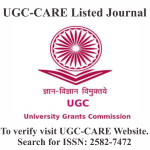HOW TO IMPACT WITH LIBRARY AND LIBRARIANSHIP INFORMATION RETRIEVAL & KNOWLEDGE
DOI:
https://doi.org/10.29121/shodhkosh.v5.i5.2024.1981Keywords:
Library Science, Librarianship, Information Retrieval, Knowledge Management, Digital Libraries, Metadata, Academic Libraries, Digital Transformation, Open Access, Information SystemsAbstract [English]
The impact of information retrieval and knowledge management in library and librarianship has evolved significantly with the advent of digital technologies and modern information systems. This study investigates the key role that libraries and librarians play in enhancing information retrieval processes and knowledge dissemination in academic, research, and public settings. It highlights the transformation of libraries from traditional repositories of books to dynamic centers for knowledge access and creation. The paper explores how advancements in digital libraries, metadata management, and search algorithms have enabled more efficient retrieval of information, thus empowering researchers, students, and the public. Furthermore, the research examines the skills and evolving role of librarians as key facilitators of knowledge management, curating and guiding users through vast resources. Challenges such as the digital divide, limited resources, and the need for ongoing professional development are also considered. The study concludes with recommendations for the future of librarianship, emphasizing the importance of adopting emerging technologies and continuing to support open access initiatives for better knowledge sharing.
References
Bush, V. (1945). "As We May Think." The Atlantic Monthly, 176(1), 101–108.
Borgman, C. L. (1996). "Why are online catalogs still hard to use?" Journal of the American Society for Information Science, 47(7), 493–503. DOI: https://doi.org/10.1002/(SICI)1097-4571(199607)47:7<493::AID-ASI3>3.3.CO;2-Y
Chowdhury, G. G. (2010). "Introduction to Modern Information Retrieval." Facet Publishing, 3rd edition.
Cronin, B. (1984). "The Politics of Library Management." Library Management, 5(3), 4-6.
Hjørland, B. (2002). "Domain analysis in information science: Eleven approaches – traditional as well as innovative." Journal of Documentation, 58(4), 422–462. DOI: https://doi.org/10.1108/00220410210431136
Lancaster, F. W. (1968). "Information retrieval systems." Wiley, New York.
Maron, M. E., & Kuhns, J. L. (1960). "On relevance, probabilistic indexing and information retrieval." Journal of the ACM, 7(3), 216–244. DOI: https://doi.org/10.1145/321033.321035
Saracevic, T. (1997). "The stratified model of information retrieval interaction." Proceedings of the American Society for Information Science and Technology, 34(5), 313–327.
Schroeder, R. (2007). "Rethinking Science, Technology, and Social Change." Stanford University Press. DOI: https://doi.org/10.1515/9781503626454
Shiri, A. (2003). "The role of classification in information retrieval." Knowledge Organization, 30(2), 64-75.
Tenopir, C. (2003). "Use and Users of Electronic Library Resources: An Overview and Analysis of Recent Research Studies." Council on Library and Information Resources, Washington D.C.
Zins, C. (2007). "Conceptual approaches for defining data, information, and knowledge." Journal of the American Society for Information Science and Technology, 58(4), 479–493. DOI: https://doi.org/10.1002/asi.20508
Weitzel, T., Wendt, O., & König, W. (2003). "Network effects and diffusion theory: extending economic network analysis to information technology." European Journal of Information Systems, 12(1), 1-11.
Tait, E., Martzoukou, K., & Reid, P. (2016). "Libraries for the future: the role of IT utilities in the transformation of academic libraries." International Journal of Information Management, 36(1), 77–84. DOI: https://doi.org/10.1057/palcomms.2016.70
Witten, I. H., & Bainbridge, D. (2003). "How to build a digital library." Morgan Kaufmann.
Downloads
Published
How to Cite
Issue
Section
License
Copyright (c) 2024 Sharanabasappa Charalingappa Talikoti

This work is licensed under a Creative Commons Attribution 4.0 International License.
With the licence CC-BY, authors retain the copyright, allowing anyone to download, reuse, re-print, modify, distribute, and/or copy their contribution. The work must be properly attributed to its author.
It is not necessary to ask for further permission from the author or journal board.
This journal provides immediate open access to its content on the principle that making research freely available to the public supports a greater global exchange of knowledge.




















